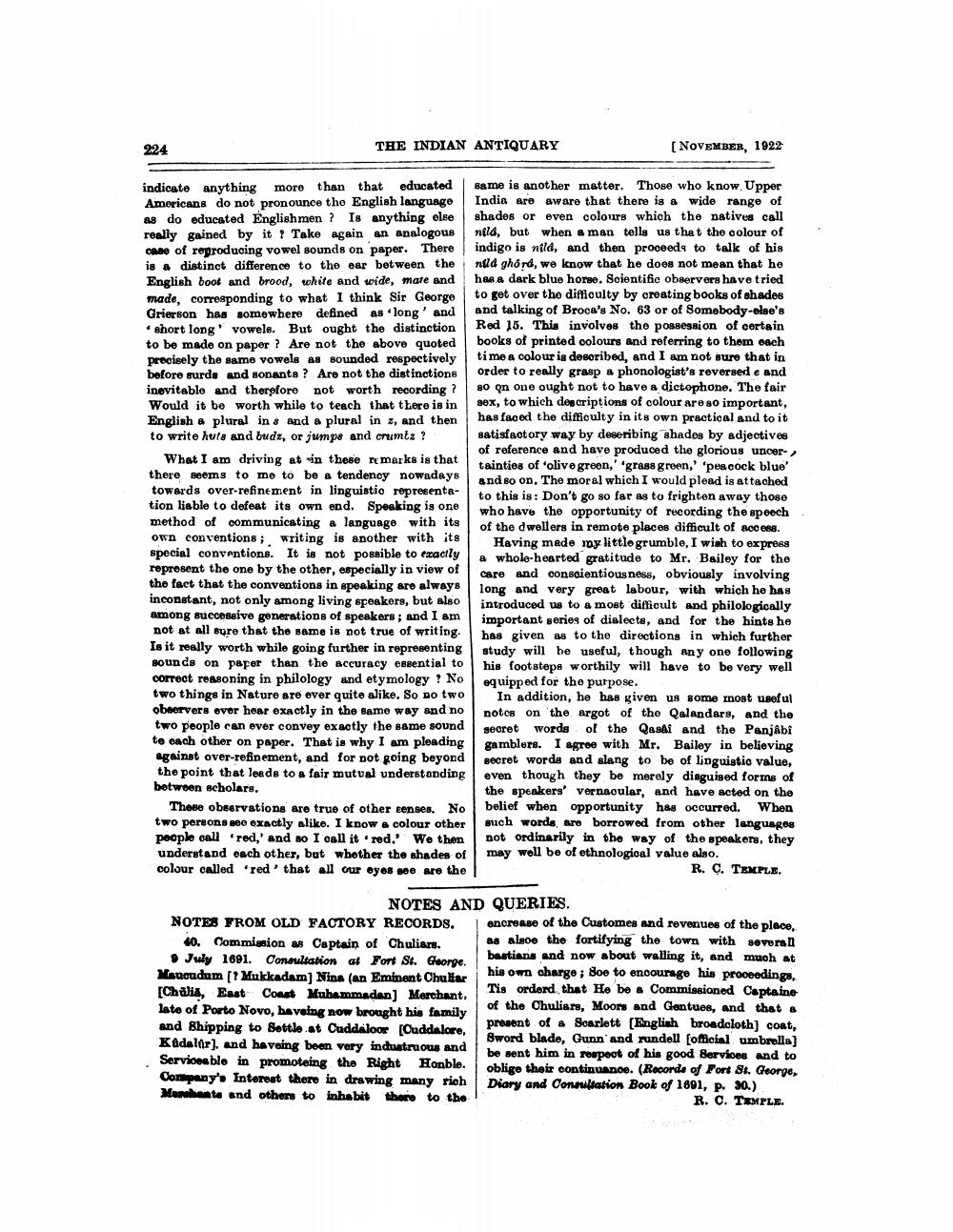________________
224
THE INDIAN ANTIQUARY
indicate anything more than that educated Americans do not pronounce the English language as do educated Englishmen ? Is anything else really gained by it? Take again an analogous case of reproducing vowel sounds on paper. There is a distinct difference to the ear between the English boot and brood, white and wide, mare and made, corresponding to what I think Sir George Grierson has somewhere defined as 'long' and short long vowels. But ought the distinction to be made on paper? Are not the above quoted precisely the same vowels as sounded respectively before surds and sonants? Are not the distinctions inevitable and therefore not worth recording? Would it be worth while to teach that there is in English a plural ins and a plural in z, and then to write huts and budz, or jumps and crumbz?
What I am driving at in these remarks is that there seems to me to be a tendency nowadays towards over-refinement in linguistic representation liable to defeat its own end. Speaking is one method of communicating a language with its own conventions; writing is another with its special conventions. It is not possible to exactly represent the one by the other, especially in view of the fact that the conventions in speaking are always inconstant, not only among living speakers, but also among successive generations of speakers; and I am not at all sure that the same is not true of writing. Is it really worth while going further in representing sounds on paper than the accuracy essential to correct reasoning in philology and etymology? No two things in Nature are ever quite alike. So no two observers ever hear exactly in the same way and no two people can ever convey exactly the same sound te each other on paper. That is why I am pleading against over-refinement, and for not going beyond the point that leads to a fair mutual understanding between scholars.
These observations are true of other senses. No two persons see exactly alike. I know a colour other people call 'red,' and so I call it 'red.' We then understand each other, but whether the shades of colour called 'red' that all our eyes see are the
NOTES AND QUERIES.
NOTES FROM OLD FACTORY RECORDS. 40. Commission as Captain of Chuliars. 9 July 1691. Consultation at Fort St. George. Maucudum [? Mukkadam] Nina (an Eminent Chuliar [Chalia, East Coast Muhammadan] Merchant, late of Porto Novo, haveing now brought his family and Shipping to Settle at Cuddaloor (Cuddalore, Kadalar], and haveing been very industruous and Serviceable in promoteing the Right Honble. Company's Interest there in drawing many rich Manhante and others to inhabit there to the
[NOVEMBER, 1922
same is another matter. Those who know. Upper India are aware that there is a wide range of shades or even colours which the natives call nild, but when a man tells us that the colour of indigo is nild, and then proceeds to talk of his nild ghord, we know that he does not mean that he has a dark blue horse. Scientific observers have tried to get over the difficulty by creating books of shades and talking of Broca's No. 63 or of Somebody-else's Red 15. This involves the possession of certain books of printed colours and referring to them each time a colour is described, and I am not sure that in order to really grasp a phonologist's reversed e and so on one ought not to have a dictophone. The fair sex, to which descriptions of colour are so important, has faced the difficulty in its own practical and to it satisfactory way by deseribing shades by adjectives of reference and have produced the glorious uncertainties of 'olive green,' 'grass green,' 'peacock blue' and so on. The moral which I would plead is attached to this is: Don't go so far as to frighten away those who have the opportunity of recording the speech of the dwellers in remote places difficult of access.
Having made my little grumble, I wish to express a whole-hearted gratitude to Mr. Bailey for the care and conscientiousness, obviously involving long and very great labour, with which he has introduced us to a most difficult and philologically important series of dialects, and for the hints he has given as to the directions in which further study will be useful, though any one following his footsteps worthily will have to be very well equipped for the purpose.
In addition, he has given us some most useful notes on the argot of the Qalandars, and the secret words of the Qasai and the Panjabi gamblers. I agree with Mr. Bailey in believing secret words and slang to be of linguistic value, even though they be merely disguised forms of the speakers' vernacular, and have acted on the belief when opportunity has occurred. When such words, are borrowed from other languages not ordinarily in the way of the speakers, they may well be of ethnological value also.
R. C. TEMPLE.
encrease of the Customes and revenues of the place, as alsoe the fortifying the town with severall bastians and now about walling it, and much at his own charge; Soe to encourage his proceedings, Tis orderd that He be a Commissioned Captaine of the Chuliars, Moors and Gentues, and that a present of a Scarlett [English broadcloth] coat, Sword blade, Gunn and rundell [official umbrella] be sent him in respect of his good Services and to oblige their continuance. (Records of Fort St. George, Diary and Consultation Book of 1691, p. 30.) R. C. TEMPLE.




